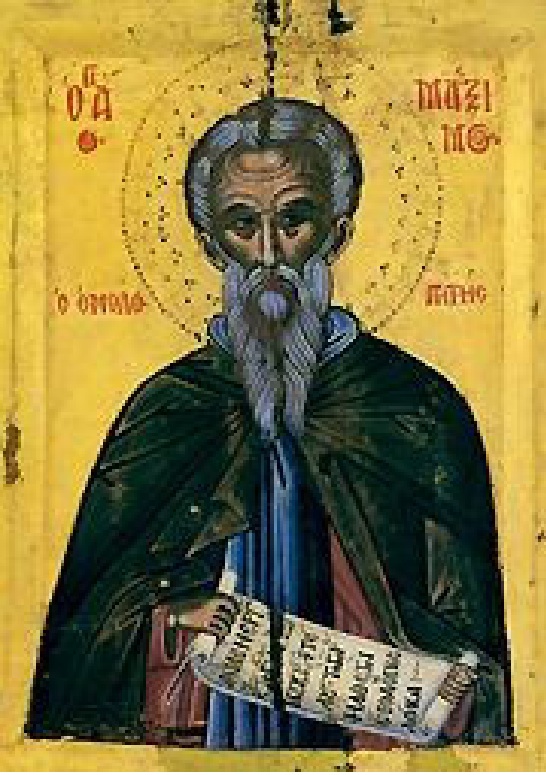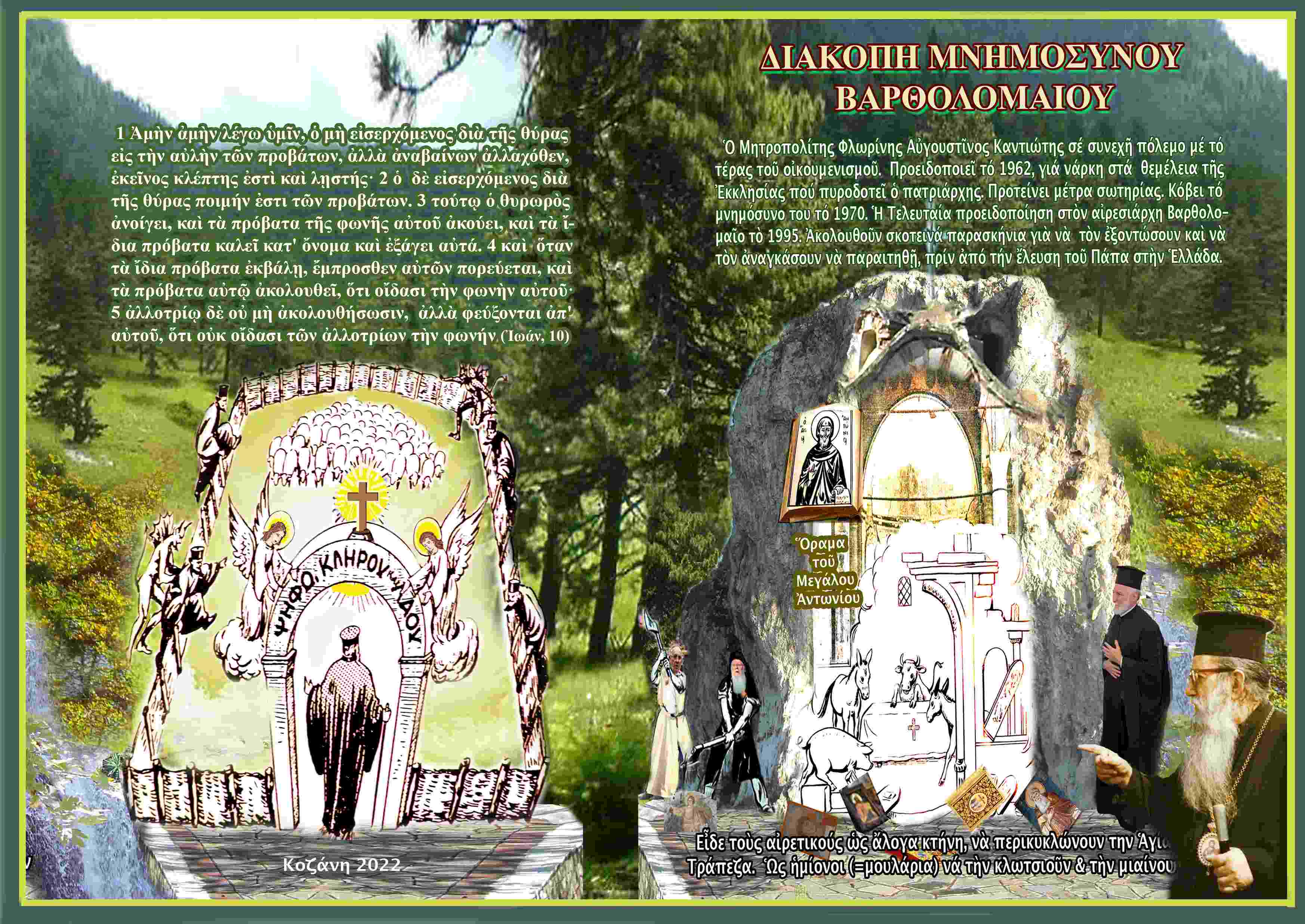ONE BRAVE CONFESSION
 Ιαν 13th, 2010 |
Ιαν 13th, 2010 |  Filed under: English
Filed under: English
Απόσπασμα από τό βιβλίο του Μητροπολίτου Φλωρίνης π. Αυγουστίνου Καντιώτου «Μυρίπνοα Άνθη – Fragrant Flowers»!
JANUARY 21
SAINT MAXIMOS THE CONFESSOR
ONE BRAVE CONFESSION
 On the 21st of January, my beloved, we celebrate the feast of one of the most brave preachers and confessors of our Orthodox faith, Saint Maximos. To him we dedicate this short sermon.
On the 21st of January, my beloved, we celebrate the feast of one of the most brave preachers and confessors of our Orthodox faith, Saint Maximos. To him we dedicate this short sermon.
***
Saint Maximos lived in the seventh century A.D. He was born in Constantinople. He loved education from childhood. He studied philosophy and theology and he was admired for his education. Due to his talents he was received as a high administrator in the emperor’s court. He quickly became the chief secretary, which was a great honor. At that time the emperor was Heracleios – the one who defeated the Persians and took back the Holy Cross which the barbarians had seized. During his reign the city was saved from the siege of the Avars and the people chanted for the first time the Akathist Hymn. Heracleios was a faithful and pious king. On the serious subject of heresy, however, he showed a degree of leniency which Maximos did not like at all. Maximos considered the heretics very dangerous and he wanted the State to observe a strict stance in their relation to the Church. The heretics were so audacious that, if they were left free, there was a danger that a great part of the population would fall prey to their heresy. At that time the heresy of monotheletism was spreading.
Let us say a few words concerning what monotheletism means. Christ, the Lord of our Faith and found of our religion is God and man. He is God-man and He has two wills. As a man He has will – pure, however, from the filth of the sin. As God He has a holy and omnipotent will. These two wills are united in Christ. The human will is subject to the will of God, and there exists a harmony of the wills in the person of Christ. There is no confrontation in Christ between the divine and the human will. However, how the union of the two natures and the harmony of the two will occurs is a mystery. As the fathers of our Church say, as an iron when put into the fire gets hot and becomes red – that is, it is united with the fire without losing anything from its nature – so also was Christ as a man united with the divine nature without losing anything in His human nature. He received the brightness of Divinity, it sparkled, and His human nature likewise became glorious and ascended into heaven. Man is called to reach this great height, which no human language can describe. He reaches it with faith, which allows the weak man to become united with Christ and become himself, in some way, god-man; an imitation of the God-man.
This was the instruction of the Orthodox teachers concerning the two natures and the two wills of Christ. The heretical montheletes argued that, if we say that Christ has two wills, divine and human, we undermine Him. For the reason they were saying that there is only one will in Christ – the will of God which absorbed the human will. These things we say here may appear to be complex. This heretical teaching, however, left the Christian world shaken. The monotheletes, with the toleration and support of the emperor, spread widely. Heracleios was not a monothelete, but rather was trying to reconcile the parties and bring some kind of peace between the opposing groups. In matters of faith, however, diplomacy is not needed; in matters of faith there is only the power of “yes” or the “no”; there is no middle ground. Because Maximos did not agree with the policy which Heracleios was following in this matter, he decided that he should resign from his duties to the emperor and to stop serving the emperor as chief secretary. He sacrificed his important position, salaries and profits and retired to a monastery in a remote desert place. He clothed himself in hardship in order to pray, study and be prepared for the hard fight for Orthodoxy.
It would have been pleasing for Maximos to remain forever in the monastery. When he heard, however, that the heretics – horrible wolves – were rushing into the foal of the Church and were snatching the sheep of Christ, the could not remain idle. He decided to leave the peaceful monastic life and throw himself into the great struggle for Orthodoxy. He became, in his time, a second great Athanasios. He fought with all the strength of his soul. His weapons were his education, his wisdom, and foremost his ascetic and holy life. He ran everywhere; not only to Constantinople, but also to Alexandria and to other regions of Africa and even to Italy and Rome, to help give support to other Orthodox bishops in their struggle against heretics. He contributed much to the condemnation of the heresies of the monotheletes.
Emperor Constance, a supporter of heretics, was enraged against Maximos for his brave fight and ordered him to cease his speaking and disturbing the peace of his empire. His silence, however, would be a betrayal of Orthodoxy. Alas, if those who must speak and defend Orthodoxy keep silent. The heretics, if they do not face opposition, will progress and expand. Saint Maximos did not obey to the emperor’s order. Now, with even more power he was preaching the grandeur of Orthodoxy. The enemies of Orthodoxy persecuted him and exiled him to different regions of the Empire. Wherever they sent him, though, Saint Maximos did not cease to preach the word of Orthodoxy. Finally they brought him to Constantinople in order to judge him again. They tried to change his mind, but it was impossible. The emperor was enraged, became wild like a beast, and ordered his tongue and right hand to be cut off, so that he could neither speak nor write about Orthodoxy. The cruel and the inhuman order was executed. His tongue and right hand were cut off and Saint Maximos was no longer able to speak or write. In this condition, however, he never stopped being a living protest against the heretics. Finally, he was exiled to Laziki of Pontus and there in 662 Saint Maximos gave up his spirit to the Lord.
***
My beloved! The Gospel says that, once when the lepers saw Christ from afar, they began calling him saying “Jesus, Master, have mercy on us” (Luke 17:13). The Lord cured them. Those of us who believe in Christ should not hide our feelings and our faith, but we must raise our voice and confess Christ. No power should be able to close our mouths. Everywhere and always we must preach and confess Christ and Orthodoxy. In this way the world would be cured from the leprosy of sin and error. The word of Christ is an omnipotent physician. Saint Maximos preached this word of Christ with an indomitable courage. He became one of the most indomitable preachers and confessors of Orthodoxy. Le us also imitate him in this difficult time we are living.
This chapter was taken from the book “Fragrant Flowers”
by Bishop Augoustinos N. Kantiotes.
e-mail: ibmgs3@verizon.net
http://www.ibmgs.org
http://www.ibmgs.org/chatechetic.html


Add A Comment
You must be logged in to post a comment.